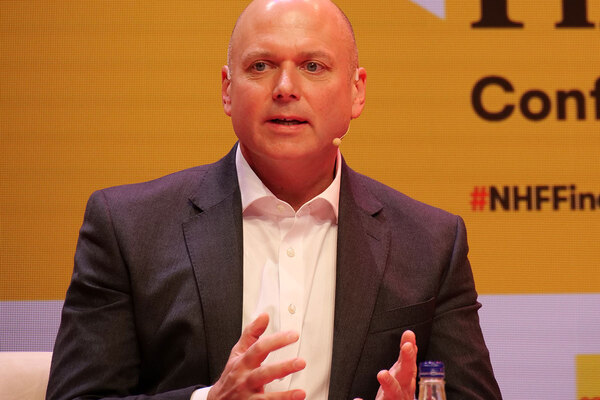How can a Labour government hit the ground running in the first 100 days?
The Labour Party is now in power, and housing seems to be high on its agenda. James Riding asks members of the sector what policies the new government could implement in its first 100 days to make an impact. Illustration by Rebecca Hendin
The stage is set. A Labour majority of 174. An eye-watering target of 1.5 million new homes by the end of the parliament. The election result even brought down Theresa Villiers – the ‘nimby in chief’ Conservative MP whose rebellion neutered housing targets – as she was swept away on a tide of red.
Prime minister Sir Keir Starmer’s government wants to move fast on housing. In her first speech as chancellor on 8 July, Rachel Reeves said that mandatory housebuilding targets for councils will be restored and a new taskforce will be created to accelerate stalled housing sites. She also said the government would “call in” big planning applications that were stuck in limbo, fast-tracking around 14,000 homes in Worcestershire Parkway, Liverpool, Cambridgeshire and Sutton Coldfield, as well as hire 300 new planning officers.
The team tasked with delivering sweeping planning reform is in place. Deputy prime minister Angela Rayner has been made housing secretary – a sign of the importance of housing to Labour’s strategy.
Under Ms Rayner in the renamed Ministry of Housing, Communities and Local Government is Matthew Pennycook, who is considered by many in the sector as the most knowledgeable and passionate housing minister in years. Jim McMahon has taken on the local government brief, while Rushanara Ali is expected to take on building safety.
The sector’s stall
So what does the housing sector want to see from Labour in its first 100 days?
The National Housing Federation (NHF) and Chartered Institute of Housing set out their stall in a letter to Ms Rayner on 11 July, which was co-signed by the 20 biggest council landlords. They urged the new housing secretary to address “years of policy uncertainty and underfunding” with a “long-term plan for new and existing social homes, underpinned by a fair and sustainable financial model”.
The NHF has penned a ‘Social Housing Renewal Plan’, which calls for the Affordable Homes Programme (AHP) and Social Housing Decarbonisation Fund (SHDF) to be extended immediately by a year. The housing body also wants a 10-year rent settlement of the Consumer Price Index plus 1% and convergence, and for social landlords to be able to access the Building Safety Fund.
Among other short-term demands, the NHF asked for emergency funding for homelessness and supported housing services to help councils in financial crisis. It also urged ministers to pause any regulatory changes, arguing that the new consumer standards and tenant satisfaction measures should be given time to bed in before social landlords face more requirements.
When parliament returns in the autumn after its summer break starting on 30 July, the NHF said the government should announce a new five-year AHP of £4.6bn a year, boost the SHDF into a £2bn-a-year existing homes investment fund, and allocate £1.6bn a year for supported housing.
Labour has, of course, made it clear that there is not much money to go around. But Gavin Smart, chief executive of the CIH, says there are also some “important, low-cost actions” which the new government could take in its first 100 days.
These include: releasing the Decent Homes Standard and minimum energy efficiency standards in social housing consultations, and reducing Right to Buy discounts and allowing councils to set the discount rate.
At the same time, there should be funding for local authorities to acquire homes for temporary accommodation – which would reduce spending on homelessness, given the money councils are currently shelling out on B&Bs – and directing more existing funding to social rented homes.
Of course, without increasing the size of the AHP, any reallocation of the funding to prioritise social rent will mean other tenures lose out.
Matthew Walker, chair of PlaceShapers, says the government should extend the flexibility introduced into the AHP to allow money to be spent on regeneration and “make it easier for housing associations and others to join up funding at a local level”. This will help address the “unique housing challenges” every area faces, he says.
Clare Miller, chief executive of Clarion, believes the first few days of the new government have shown that Labour is “serious about housing” as she sets out three other priorities. “We’d like to see the government commit to a long-term rent settlement as part of their first Budget. With more certainty, we can do more.
“Second, we’d welcome discussions about funding to help us deliver the new social housing we know is so desperately needed. Thousands of children in homeless families are waking up each morning in temporary accommodation. They need the springboard of a safe, secure and comfortable home.
“Finally, it is clear many of our public services are broken. I’ve had letters from local authorities in such serious circumstances, they have asked us for a contribution to fund statutory services. Therefore, an immediate injection of cash to support our public services is essential.”
The NHF’s asks for the first 100 days
● Both the Affordable Homes Programme and Social Housing Decarbonisation Fund to be extended by a year
● A 10-year rent settlement of the Consumer Price Index plus 1%
● Social landlords to be able to access the Building Safety Fund
● Pause any new regulatory changes
● Emergency funding for homelessness and supported housing services
Bjorn Howard, chief executive of Aster Group, says shared ownership should “continue to play an important role” in affordable housing. But Labour will soon have to make tough decisions as to which tenures it wants to turbocharge.
He adds that community land trusts will be important in “adding a local voice to development programmes”.
Shelter is putting social housing at the heart of its demands. The housing charity has called for councils to be given the funding and tools to build new homes for social rent. It also wants Labour to adopt a social housing target and a nationally set 20% minimum social housing requirement on large sites.
On top of that, Labour should “immediately freeze” the Right to Buy and commit to “robust reform” of the private rented sector, after the Conservatives’ broken promise to ban Section 21 no-fault evictions.
Matt Downie, chief executive of Crisis, says setting up a cross-government ‘office for ending homelessness’ is “a critical first step”. Backed by the prime minister, this would set the strategy, oversee delivery, and bring charities, councils and housing providers together to end homelessness.
“We would also like to see the government publish a white paper that sets out plans to deliver the largest increase in social housing in a generation,” he adds.
Regional voices
What do the UK’s regions want from Labour? John Bowker, chair of JV North, says: “We need the existing AHP extending, with the budget increased, before being overhauled with a permanent supply of funding that we can continually access.”
This will allow Northern landlords to deliver “large-scale regeneration projects” and remove the “inefficient stop-start nature” of bidding for short-term programmes, he says.
A spokesperson for Shelter Cymru says the housing benefit must cover the “real cost of renting” in Wales. The charity also calls for an end to “punitive policies” such as the two-child limit and household benefit cap.
Sally Thomas, chief executive of the Scottish Federation of Housing Associations, says Labour should introduce an energy tariff for social renters, which would “lift millions of social tenants (and others) out of fuel poverty, support the UK’s transition to net zero, and especially help people in our rural communities who face the higher costs of electricity”.
The group is also pushing for an ‘essentials guarantee’ for Universal Credit to ensure the social security system covers the cost of essentials, and increased capital funding to help address the housing emergency declared by the Scottish National Party in May.
Private sector players
The number of homes owned by for-profit registered providers is set to treble by the end of 2028, according to property consultancy Knight Frank, so the private sector is increasingly likely to have Labour’s ear when shaping housing policy.
Blackstone-backed Sage Homes is keeping its demands low-key for now, however. A spokesperson says the government should rightly prioritise “policy stability and a long-term rent settlement” to help attract more investment into the sector.
14k
Homes to be fast-tracked by Labour calling in stuck planning applications
300
New planning officers Labour plans to hire
174
The Labour government’s majority
1.5m
Homes Labour aims to deliver by the end of parliament
Meanwhile, Charles Roe, director of mortgages at UK Finance, which represents banks, calls for planning reform and “more targeted help for social housing tenants, to ensure they are not left behind in the transition to improve homes’ energy efficiency”.
Richard Petty, head of UK residential valuation at property consultancy JLL, wants to see a “reset of the strained relationship between the government and the housing sector, to create a new spirit of partnership with developers and private capital”.
If Labour can “create belief in a consistent housing policy”, including a long-term rent settlement, then investment and building will “start to flow”, he says.
“I’d also like to see Labour leave the market to operate and resist the temptation to legislate as much as possible.” For example, Mr Petty adds: “We demonise and destroy the private rented sector at our peril.”
JLL has been outspoken on the need to scrap the Right to Buy. “If you want to refill a bath, you should start by putting the plug in,” Mr Petty says. “Last year, we sold and demolished far more social homes than we built. A quick win would be to end the Right to Buy, so that we preserve the valuable social housing stock we have.”
Tim Hyatt, head of UK residential at Knight Frank, has a simple request of the sector. He says the new housing minister must be given the “opportunity and time to make impactful change”.
The effect of 16 ministers in this position over the past 13 years has resulted in “little progress when it comes to driving housing supply, much-needed reform to the planning system and unlocking suitable land for development”, he explains. “This key position must be prioritised by the new government, helping to give the sector the tools it needs to get Britain building.”
Building safety
Building safety measures following Grenfell were not one of the central tenets of Labour’s election campaign.
The most recent figures show there are currently 4,329 buildings in cladding remediation funding programmes, while 1,968 have started remediation and 976 have finished.
A ‘national cladding taskforce’ was called for in 2021 by Sir Keir in order to identify potentially dangerous buildings and remediate them. There was discussion by Labour in the same year about the idea of creating a building works agency that would assess buildings, remediate them and provide certification.
However, following Michael Gove’s measures to get developers to engage in funding remediation, Labour has not raised this idea again, instead choosing to criticise the speed at which the Conservatives’ strategy on mediation contracts has progressed. Inside Housing previously reported how the latest remediation figures do not show the full scale of affected buildings, with those below 18 metres likely to grow sharply as more are identified, nor do they distinguish by risk category.
Legal director Marisa Abrahams and property litigation partner Claire Lamkin, from the real estate and construction team at Kingsley Napley, point out that measures in Section 117 of the Leasehold and Freehold Reform Act 2024, which are due to take effect on 24 July 2024, may bring the issue of cladding and building remediation costs to the top of Ms Rayner’s inbox sooner than she may have expected.
This is because the newly amended section will enable Right to Manage companies and resident management organisations to recover their costs incurred in seeking remediation contribution orders from leaseholders through the service charge (assuming there is a costs recovery clause in the lease). Ms Abrahams and Ms Lamkin believe “this clearly flies in the face of Ms Rayner’s earlier position on unfair costs”.
Inside Housing’s Peter Apps previously pointed out that Labour could also force the insurance industry to be more consistent, using the Treasury balance sheet to reduce the risk of major payouts in big building fires.
At a minimum, Labour could expedite the construction products regulation white/green papers promised by the Conservatives and get insulation and cladding manufacturers to pay for fire safety fixes.
Recent longform articles by James Riding
Dagenham fire: what happened and what we know about the building
A fire at a block of flats in Dagenham, east London, on Monday has sparked fresh debate about the slow progress of cladding remediation in the UK. James Riding runs through what we know so far
Peter Denton discusses the Homes England review and Section 106 jitters
Homes England’s chief executive tells James Riding that a new government review is a “call to arms” for the agency to take a more hands-on role in development
The man who runs Homes England’s Affordable Homes Programme
Shahi Islam speaks to James Riding about his new role as director of Homes England’s Affordable Homes Programme and his desire to be “more front-facing” in the sector
Sign up for our daily newsletter
Already have an account? Click here to manage your newsletters









